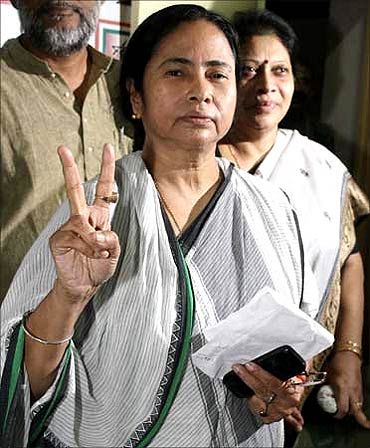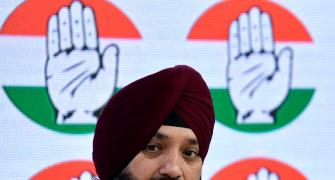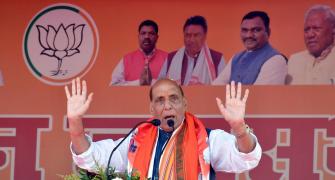The Duncans Goenka group is in a spot of bother over the death of workers and non-payment of dues to employees.
 In early 1979, Kolkata-based Keshav Prasad Goenka arranged his companies into three lists to distribute them between his three sons: Rama Prasad, Jagdish Prasad and Gouri Prasad.
In early 1979, Kolkata-based Keshav Prasad Goenka arranged his companies into three lists to distribute them between his three sons: Rama Prasad, Jagdish Prasad and Gouri Prasad.
The youngest of the three, Gouri Prasad, was asked to pick his list first.
He chose Duncans Agro Industries, the crown jewel.
"The tea and cigarette manufacturer with assets of Rs 54 crore (Rs 540 million) was an industrial status symbol like Birla's Century," writes Gita Piramal in Business Maharajas.
Duncans Agro Industries was a subsidiary of Duncan Brothers, the European managing agency.
It was a coup of sorts in the 1950s when the Goenka family, led by Keshav Prasad, took control of Duncan Brothers after it failed to honour its loan commitments.
It set the stage for future growth and the group came to be known as the Duncans Goenka group.
Cut to 2015. The Duncans Goenka group is in a spot of bother over the death of workers and non-payment of dues to employees.
Duncans employs 18,000 people across its 15 gardens in north Bengal.
All told, livelihoods of 50,000 people depend on these gardens. Their unrest cannot be ignored politically.
West Bengal Chief Minister Mamata Banerjee has threatened to take control of its 15 gardens that can produce 15 million kg of tea in a year.
What galvanised Banerjee to issue the threat was the death of 18 people who reportedly worked for Duncans.
Elections to the state legislative assembly are scheduled for April or May, and her Trinamool Congress did poorly in the recent civic polls in Siliguri.
In other words, it is not a threat Gouri Prasad can afford to be dismissive of.
Already, Banerjee's government has initiated a Criminal Investigation Department (CID) inquiry against Duncans.
Apart from senior board members, Gouri Prasad too had to make an appearance at Bhabani Bhavan, the CID headquarters in Kolkata.
Gouri Prasad Goenka, Duncans Gouri Prasad Goenka Gouri Prasad says he has explained to the state administration that the dead were not workers of Duncans.
"Only two workers were associated with the Bagracote tea garden, but they died due to external reasons: one came under a train and the other had a medical condition. I have sent the medical reports to the government," he says.
"The dead may not be direct workers of the gardens but they used to live on the premises of the garden because they were part of the ecosystem," says Centre of United Trade Union Congress's state secretary, Ashok Ghosh.
A heavy burden
Extra baggage is precisely what the tea estates have been fighting for a while now.
"On an average, tea prices have increased by 3-4 per cent per annum over the last three year, though this year has been exceptionally weak. But the costs have increased much more," an industry veteran points out.
While the West Bengal government is yet to notify a minimum wage for the industry, a three-year tripartite agreement was signed in 2013.
In the first year, the minimum daily wage increased from Rs 95 to Rs 112.50; it's now at Rs 122.50; and in April it will increase by Rs 10-11. This works out to around 40 per cent increase in three years.
The estates argue that there is a strong payment in kind - the Plantation Labour Act, 1951, says that wages can be paid in cash and kind - which makes the wage inflation unbearable for them.
"We have studied 147 gardens in Assam and the cash and in-kind payment adds up to Rs 249, of which the cash component is Rs 115. The in-kind payment for north Bengal should be around the same," says Indian Tea Association Secretary General Arijit Raha. The in-kind benefits could be subsidised ration, medical facilities and education for children of the workers.
In spite of the wage disputes, Duncans is something like an outlier: apart from it, there are just four or five gardens in distress in all of north Bengal.
The core challenge at Duncans is cash flows: they are not strong enough to clear the dues of employees.
"The main issue is wage arrears and provident fund dues," says West Bengal Agriculture Minister Purnendu Basu. Ghosh, the labour leader, blames the promoters for this. "They didn't invest money in the gardens. The gardens have been exploited."
Gouri Prasad insists that in three of the 15 gardens, there are no dues; in two, the dues are down to 15 days; and in the rest, the dues are for a month and a half.
Also, 60 per cent of the bonus was paid in October and the balance would have to be cleared in July.
The start of trouble
How did things come to such a pass? "Competitors gave the workers extra incentives to stay away from Duncans gardens," says Gouri Prasad.
"So in June-August, none of the gardens had workers, there was zero attendance. No worker means no crop, no crop means no money."
It became a vicious cycle. With their wages in arrears, workers started selling tea leaves directly.
Gouri Prasad says that much of that problem is now sorted out, except for the Birpara tea estate. In these gardens, a fresh agreement is being drawn up with the unions on productivity.
Former employees of Duncans say that the current situation was inevitable and the problem dates back to 2002; salaries were delayed then too, they say.
In 1994, Duncans had bought ICI India's fertiliser plant in Kanpur. It was a hugely profitable business.
In 2002, when the government's subsidy policy changed, the division had made a profit of Rs 100 crore (Rs 1 billion).
The change in policy resulted in a bill of Rs 460 crore (Rs 4.6 billion) for Duncans as the government revised subsidies with retrospective effect from 1997.
"The entire Duncans account was messed up. Nine months down the road, the working capital vanished. It became a bad asset for ten banks," Goenka recalls. Finally, in 2010, Goenka exited the business by selling it to Jaypee.
But the fertiliser debacle left its mark on the tea business. "Banks were stifled because of fertiliser," Goenka says. It also meant that getting funds for tea would be that much more difficult.
There were other diversifications too that didn't quite work out for the Duncan Goenka group. Consolidated Fibres & Chemicals went into liquidation.
Herdillia Chemicals was sold to Schenectady and Andhra Cement to the Jaypee group.
Right now, apart from Duncans Industries, the companies in Gouri Prasad's portfolio include Duncans Tea, Stone India, Star Paper Mills, Unimers India and NRC.
Is there a way out of the mess? "I need to arrange Rs 40 crore (Rs 400 million), pay wage arrears and get the estates back in shape. By March 31, I will not only clear the wages, but the backlog as well," Gouri Prasad says.
Some of this money could come from divestments. One of his estates, Dimdima under Shantipara Tea Co, is known to be on the block.
The estates under Duncans Industries will have to go through an elaborate approval process before they can be sold because it's a sick company and will need the Board for Industrial & Financial reconstruction's approval.
But time is running out for Gouri Prasad. With winter approaching, soon there will be no leaves left for the workers to pluck and sell on their own.
"They are already trying to get back but we are pushing it back. We have set a charter of demands, they will first have to agree to it," Gouri Prasad says.










